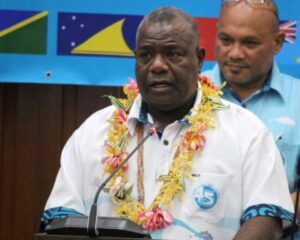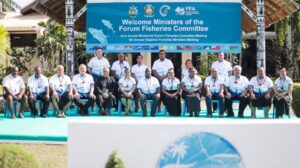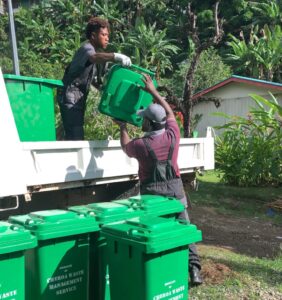RESEARCH scientists from AgResearch, a New Zealand Government research institute to give updates to the Ministry of Agriculture & Livestock (MAL) and Biosecurity Solomon Islands (BSI) on their research work involving CRB-G.
Sean Marshall and Trevor Jackson have been working on research into suppression of CRB-G since they first discovered the new biotype. They have been involved in several high level meetings, including a National Task Force meeting, held in Honiara with all MAL/BSI departments, and donors and stakeholders involved in the “Join the Fight” campaign to suppress the CRB-G incursion and containment of the spread.
Trevor Jackson, who first came to the Solomon Islands in 1996 to work on agricultural pests, has stated that “the incursion of CRB is an unprecedented disaster for the pacific region, but it is good to see the progress being made in the Solomon Islands by MAL and BSI against the incursion. Arguably, coconuts are the most important crop for the Solomon Islands, so do need protection”.
The scientists, along with MAL/BSI, donors and stakeholders, congregated last week to set the program going forward, and discuss the progress that has been made on the CRB-G incursion.
Visiting experts were pleased to see the progress of the coordination including awareness campaigns and extensive clean-up efforts through-out Honiara. The scientists said that they can clearly see now that severe outbreaks are related to breeding sites, and where the community and BSI have been involved with clean-up work, this has resulted in scientists seeing less damage occurring. Trevor Jackson said “With the continued effort on clean-up the results can be seen to have had an impact on controlling the pest”.
The scientists state that there is a strong international effort to develop a biological control, and that progress is being made. However, scientist Trevor Jackson stressed that “it is important that for any biocontrol to be released into the environment that it is thoroughly tested in a laboratory to avoid any unintentional consequences”. While the research work is continuing with anticipation of discovery of biocontrol, the options to address the CRB is clean-up and more awareness in Honiara and throughout the provinces. Plantation sanitation requires farmers and community efforts.
The findings and words of the scientists echo the statements that the Permanent Secretary of Ministry of Agriculture and Livestock, and the Director of Biosecurity Solomon Islands, continue to reinforce to the community. That is to actively take control of managing your own small or large plantation of coconut palms and ensure that you clean-up all surrounding vegetation that serves as a breeding site for CRB-G. This includes spreading out piles of chicken manure and sawdust, and kill any beetles and larvae that are discovered in the clean-up. Remembering that once killed, the beetles and larvae are a great source of food protein for chickens and pigs.
This sanitation management of coconut palms is being called for, along with the community behavioural and mind-set changes, which is to understand that this is a national challenge that the entire community is being asked for their help to suppress the CRB-G. The message is, play your part in biosecurity for the greater good of the Solomon Islands.




